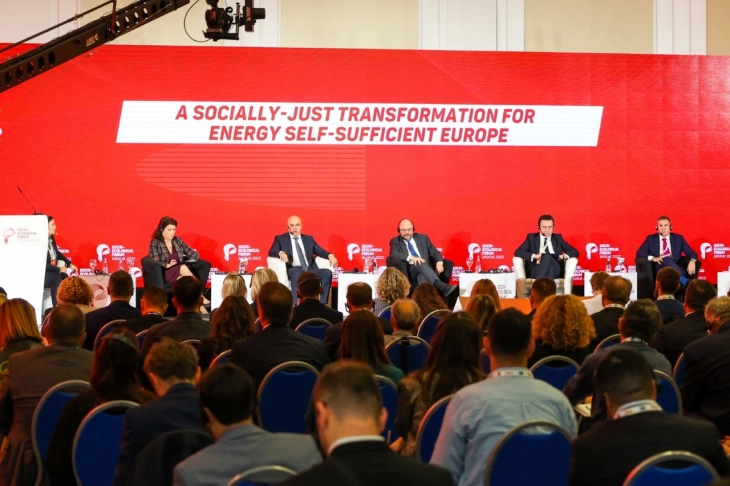SEF 2022: Urgent social and ecological transformation required in regional countries

Skopje, 22 November 2022 (MIA) - We live in a time of contradictions. On one hand, we need global solutions, but at the same time we witness structures and institutions that we need to come to global solutions have weakened. We need global legally bindings conclusions and decisions for social and ecological transformation, said Martin Schulz, former president of the European Parliament and current Chair of the Friedrich Ebert Foundation, at the second Socio-Ecological Forum (SEF) in Skopje.
Highlighting the importance and urgent need for a social and ecological transformation in the Western Balkan countries, Schulz said there is a possibility for close cooperation with the European institutions for implementing environmental-related policies so as to overcome the green agenda consequences more efficiently.
"International cooperation is needed, especially the UN role that is under threat since it is becoming quite difficult for the global participants to come to joint legally binding conclusions. The UN Security Council is in an absurd situation given the fact that a country causing the problems is also able to block decisions, which is the case with Russia as it is violating international rules," Schulz said
This is the reason, he noted, why the countries are focused on national solutions, which leads to a heterogenic situation.
"We have to invest politically everything that is necessary in this social and ecological transformation. The citizens should be told that there will be changes especially because of the war in Ukraine, which us directly affecting the surge in energy and food prices," stated the former EU official.
Touching upon the EU integration processes of the countries in the region, he said the European Union must understand that Europe belongs not only to the EU member states.
The EU, said Schulz, has abundant funds and it shouldn't be a problem to set aside financing for those affected most by this situation. You should loudly say to the EU member countries that there shouldn't and there mustn't be double standards. I can say North Macedonia had met all the conditions especially after signing the Prespa Agreement.
Any crisis requires cooperation, said Kosovo Prime Minister Albin Kurti addressing the forum.
"Overcoming of complex problems requires building of strong alliances in order to build resilient societies in Europe and beyond. I believe the energy crisis can be settled only if we seek solutions for the region, not only for us, individual solutions," he stated.
The Kosovo government, the PM added, has been laying down new foundations for the future energy sector so as to provide clean energy, energy efficiency, active participation of the citizens and providing support for vulnerable groups.
"As regards strong regional cooperation, Kosovo is committed to meeting all of its obligations according to the agreement for the energy community and to create a free and competitive electricity market. We're also working to integrate the markets and to us, integration with the Albanian energy market is what is important. We're all in an energy transition process and we only need to provide uninterrupted transformation and just transition. We need an energy policy that provides energy the citizens can afford," said Kurti adding that Kosovo will build 14,000 megawatt solar capacities by 2031.
Ex-Swedish foreign minister Ann Linde put an accent on social cohesion as key component in the creation of a social framework that will guarantee inclusivity in the societies where social vulnerable groups are affected the most by the economic and energy crisis.
"Social development has to be the main component in this process. Complete transformation of our societies is needed, especially in Southeastern Europe where the challenge is greater. Up to 40 percent of the population in these countries cannot heat their homes. Climate transition is the most important challenge, because there are social and economic consequences," Linde said stressing that the transition has to guarantee a place for the citizens on the labor market.
Albania isn't doing anything different than the challenges of other countries, said Damian Gjiknuri, Secretary General of the Albanian Socialist Party.
"Albania depended only on one source, hydro energy, which is a vulnerability in times of crisis. It revealed the importance of having more energy sources. The main policy of all countries in the region and Europe should be combining of these different sources, thus becoming competitive on the energy market," he told today's Socio-Ecological Forum in Skopje, organized by Friedrich-Ebert-Stiftung (FES), Olof Palme International Center and the Progres Institute for Social Democracy.







